CHCECE020: Cooperative Behaviour Plans - Knowledge Assessment V3.0
VerifiedAdded on 2023/06/15
|51
|16198
|233
Homework Assignment
AI Summary
This document presents a knowledge assessment for CHCECE020, focusing on establishing and implementing plans for developing cooperative behavior in children. It addresses key regulations and standards, including National Regulation 155 and 168, National Quality Standards QA 6.1 and 6.2, the Code of Ethics, Early Years Learning Framework Outcomes 1 and 2, and United Nations Convention on the Rights of the Child Articles 2 and 3. The assessment requires matching contributing factors to example scenarios, such as age and developmentally appropriate behavior, health and wellness, educator influences, and cultural influences, to foster a better understanding of cooperative behavior development. Desklib offers a wide range of study resources, including solved assignments and past papers, to assist students in their academic endeavors.
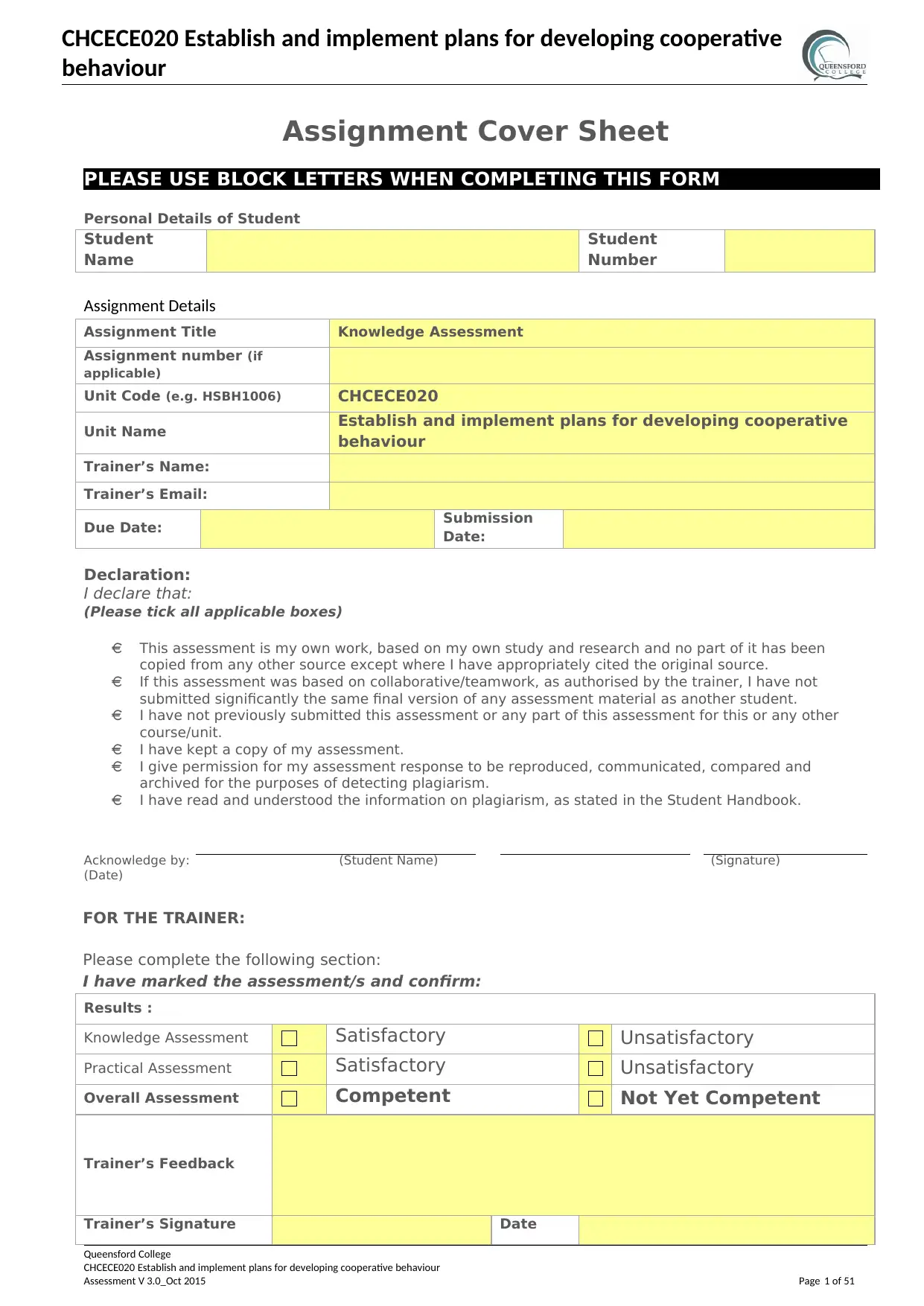
CHCECE020 Establish and implement plans for developing cooperative
behaviour
Assignment Cover Sheet
PLEASE USE BLOCK LETTERS WHEN COMPLETING THIS FORM
Personal Details of Student
Student
Name
Student
Number
Assignment Details
Assignment Title Knowledge Assessment
Assignment number (if
applicable)
Unit Code (e.g. HSBH1006) CHCECE020
Unit Name Establish and implement plans for developing cooperative
behaviour
Trainer’s Name:
Trainer’s Email:
Due Date: Submission
Date:
Declaration:
I declare that:
(Please tick all applicable boxes)
This assessment is my own work, based on my own study and research and no part of it has been
copied from any other source except where I have appropriately cited the original source.
If this assessment was based on collaborative/teamwork, as authorised by the trainer, I have not
submitted significantly the same final version of any assessment material as another student.
I have not previously submitted this assessment or any part of this assessment for this or any other
course/unit.
I have kept a copy of my assessment.
I give permission for my assessment response to be reproduced, communicated, compared and
archived for the purposes of detecting plagiarism.
I have read and understood the information on plagiarism, as stated in the Student Handbook.
Acknowledge by: (Student Name) (Signature)
(Date)
FOR THE TRAINER:
Please complete the following section:
I have marked the assessment/s and confirm:
Results :
Knowledge Assessment Satisfactory Unsatisfactory
Practical Assessment Satisfactory Unsatisfactory
Overall Assessment Competent Not Yet Competent
Trainer’s Feedback
Trainer’s Signature Date
Queensford College
CHCECE020 Establish and implement plans for developing cooperative behaviour
Assessment V 3.0_Oct 2015 Page 1 of 51
behaviour
Assignment Cover Sheet
PLEASE USE BLOCK LETTERS WHEN COMPLETING THIS FORM
Personal Details of Student
Student
Name
Student
Number
Assignment Details
Assignment Title Knowledge Assessment
Assignment number (if
applicable)
Unit Code (e.g. HSBH1006) CHCECE020
Unit Name Establish and implement plans for developing cooperative
behaviour
Trainer’s Name:
Trainer’s Email:
Due Date: Submission
Date:
Declaration:
I declare that:
(Please tick all applicable boxes)
This assessment is my own work, based on my own study and research and no part of it has been
copied from any other source except where I have appropriately cited the original source.
If this assessment was based on collaborative/teamwork, as authorised by the trainer, I have not
submitted significantly the same final version of any assessment material as another student.
I have not previously submitted this assessment or any part of this assessment for this or any other
course/unit.
I have kept a copy of my assessment.
I give permission for my assessment response to be reproduced, communicated, compared and
archived for the purposes of detecting plagiarism.
I have read and understood the information on plagiarism, as stated in the Student Handbook.
Acknowledge by: (Student Name) (Signature)
(Date)
FOR THE TRAINER:
Please complete the following section:
I have marked the assessment/s and confirm:
Results :
Knowledge Assessment Satisfactory Unsatisfactory
Practical Assessment Satisfactory Unsatisfactory
Overall Assessment Competent Not Yet Competent
Trainer’s Feedback
Trainer’s Signature Date
Queensford College
CHCECE020 Establish and implement plans for developing cooperative behaviour
Assessment V 3.0_Oct 2015 Page 1 of 51
Paraphrase This Document
Need a fresh take? Get an instant paraphrase of this document with our AI Paraphraser
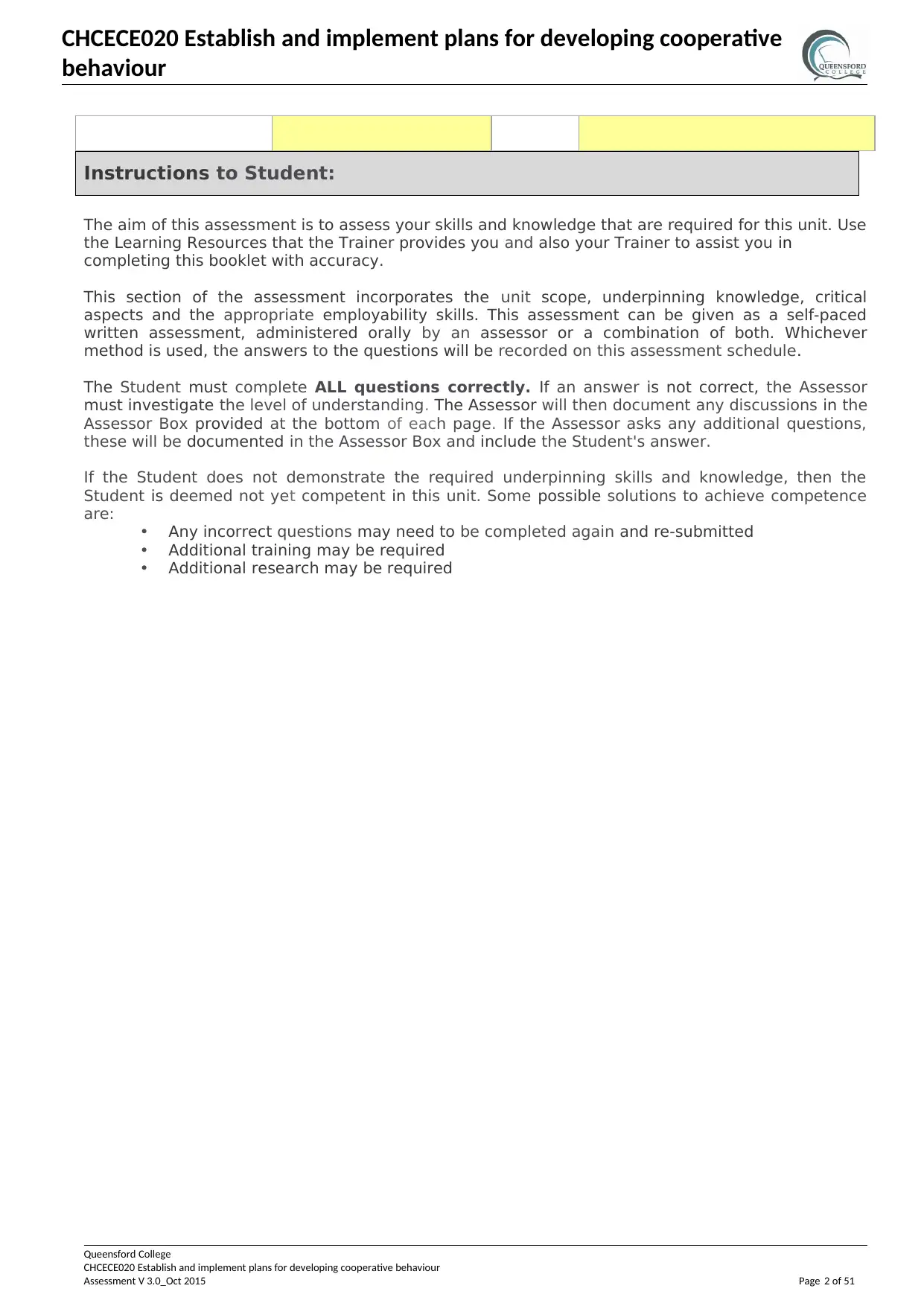
CHCECE020 Establish and implement plans for developing cooperative
behaviour
Instructions to Student:
The aim of this assessment is to assess your skills and knowledge that are required for this unit. Use
the Learning Resources that the Trainer provides you and also your Trainer to assist you in
completing this booklet with accuracy.
This section of the assessment incorporates the unit scope, underpinning knowledge, critical
aspects and the appropriate employability skills. This assessment can be given as a self-paced
written assessment, administered orally by an assessor or a combination of both. Whichever
method is used, the answers to the questions will be recorded on this assessment schedule.
The Student must complete ALL questions correctly. If an answer is not correct, the Assessor
must investigate the level of understanding. The Assessor will then document any discussions in the
Assessor Box provided at the bottom of each page. If the Assessor asks any additional questions,
these will be documented in the Assessor Box and include the Student's answer.
If the Student does not demonstrate the required underpinning skills and knowledge, then the
Student is deemed not yet competent in this unit. Some possible solutions to achieve competence
are:
• Any incorrect questions may need to be completed again and re-submitted
• Additional training may be required
• Additional research may be required
Queensford College
CHCECE020 Establish and implement plans for developing cooperative behaviour
Assessment V 3.0_Oct 2015 Page 2 of 51
behaviour
Instructions to Student:
The aim of this assessment is to assess your skills and knowledge that are required for this unit. Use
the Learning Resources that the Trainer provides you and also your Trainer to assist you in
completing this booklet with accuracy.
This section of the assessment incorporates the unit scope, underpinning knowledge, critical
aspects and the appropriate employability skills. This assessment can be given as a self-paced
written assessment, administered orally by an assessor or a combination of both. Whichever
method is used, the answers to the questions will be recorded on this assessment schedule.
The Student must complete ALL questions correctly. If an answer is not correct, the Assessor
must investigate the level of understanding. The Assessor will then document any discussions in the
Assessor Box provided at the bottom of each page. If the Assessor asks any additional questions,
these will be documented in the Assessor Box and include the Student's answer.
If the Student does not demonstrate the required underpinning skills and knowledge, then the
Student is deemed not yet competent in this unit. Some possible solutions to achieve competence
are:
• Any incorrect questions may need to be completed again and re-submitted
• Additional training may be required
• Additional research may be required
Queensford College
CHCECE020 Establish and implement plans for developing cooperative behaviour
Assessment V 3.0_Oct 2015 Page 2 of 51
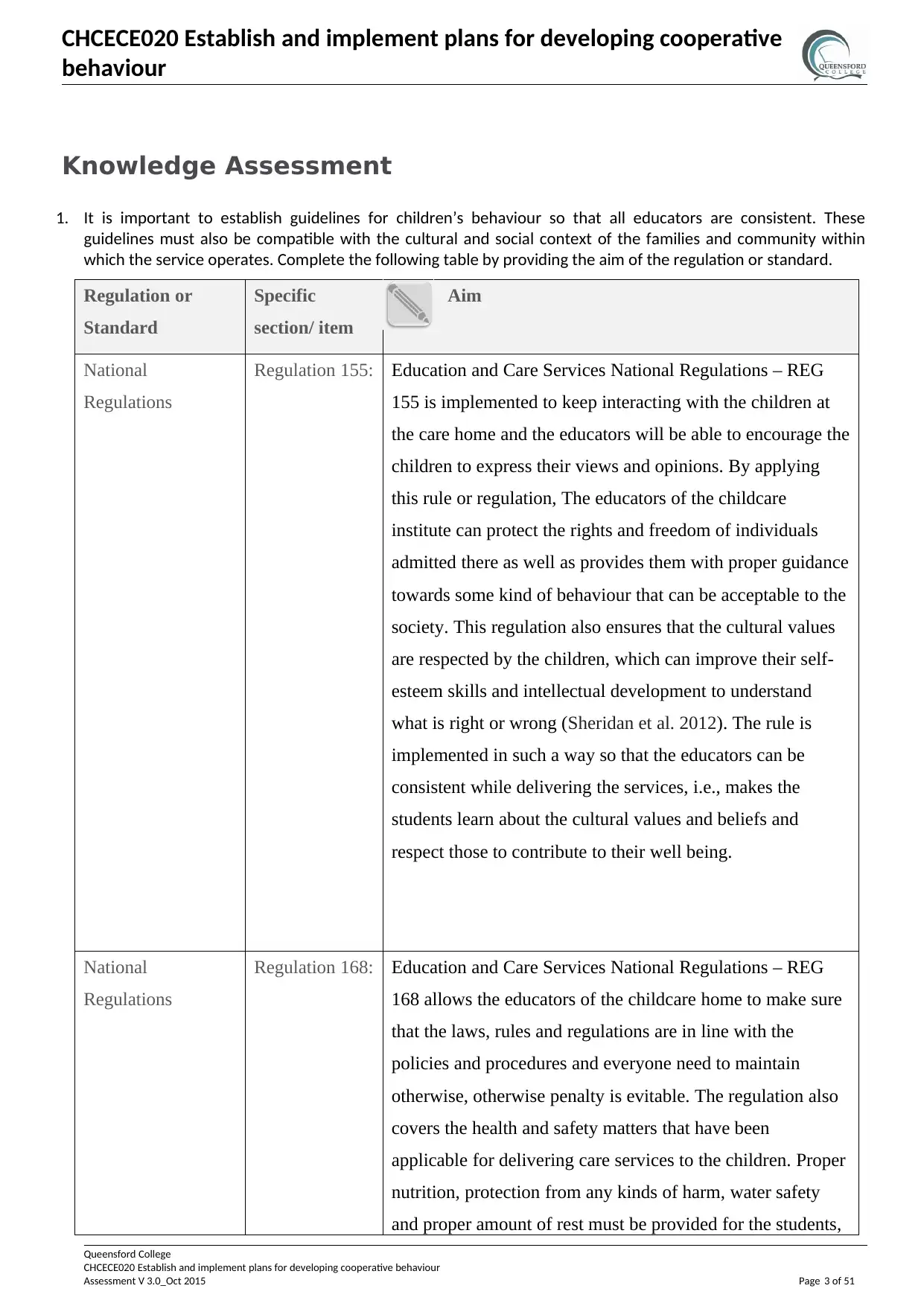
CHCECE020 Establish and implement plans for developing cooperative
behaviour
Knowledge Assessment
1. It is important to establish guidelines for children’s behaviour so that all educators are consistent. These
guidelines must also be compatible with the cultural and social context of the families and community within
which the service operates. Complete the following table by providing the aim of the regulation or standard.
Regulation or
Standard
Specific
section/ item
Aim
National
Regulations
Regulation 155: Education and Care Services National Regulations – REG
155 is implemented to keep interacting with the children at
the care home and the educators will be able to encourage the
children to express their views and opinions. By applying
this rule or regulation, The educators of the childcare
institute can protect the rights and freedom of individuals
admitted there as well as provides them with proper guidance
towards some kind of behaviour that can be acceptable to the
society. This regulation also ensures that the cultural values
are respected by the children, which can improve their self-
esteem skills and intellectual development to understand
what is right or wrong (Sheridan et al. 2012). The rule is
implemented in such a way so that the educators can be
consistent while delivering the services, i.e., makes the
students learn about the cultural values and beliefs and
respect those to contribute to their well being.
National
Regulations
Regulation 168: Education and Care Services National Regulations – REG
168 allows the educators of the childcare home to make sure
that the laws, rules and regulations are in line with the
policies and procedures and everyone need to maintain
otherwise, otherwise penalty is evitable. The regulation also
covers the health and safety matters that have been
applicable for delivering care services to the children. Proper
nutrition, protection from any kinds of harm, water safety
and proper amount of rest must be provided for the students,
Queensford College
CHCECE020 Establish and implement plans for developing cooperative behaviour
Assessment V 3.0_Oct 2015 Page 3 of 51
behaviour
Knowledge Assessment
1. It is important to establish guidelines for children’s behaviour so that all educators are consistent. These
guidelines must also be compatible with the cultural and social context of the families and community within
which the service operates. Complete the following table by providing the aim of the regulation or standard.
Regulation or
Standard
Specific
section/ item
Aim
National
Regulations
Regulation 155: Education and Care Services National Regulations – REG
155 is implemented to keep interacting with the children at
the care home and the educators will be able to encourage the
children to express their views and opinions. By applying
this rule or regulation, The educators of the childcare
institute can protect the rights and freedom of individuals
admitted there as well as provides them with proper guidance
towards some kind of behaviour that can be acceptable to the
society. This regulation also ensures that the cultural values
are respected by the children, which can improve their self-
esteem skills and intellectual development to understand
what is right or wrong (Sheridan et al. 2012). The rule is
implemented in such a way so that the educators can be
consistent while delivering the services, i.e., makes the
students learn about the cultural values and beliefs and
respect those to contribute to their well being.
National
Regulations
Regulation 168: Education and Care Services National Regulations – REG
168 allows the educators of the childcare home to make sure
that the laws, rules and regulations are in line with the
policies and procedures and everyone need to maintain
otherwise, otherwise penalty is evitable. The regulation also
covers the health and safety matters that have been
applicable for delivering care services to the children. Proper
nutrition, protection from any kinds of harm, water safety
and proper amount of rest must be provided for the students,
Queensford College
CHCECE020 Establish and implement plans for developing cooperative behaviour
Assessment V 3.0_Oct 2015 Page 3 of 51
⊘ This is a preview!⊘
Do you want full access?
Subscribe today to unlock all pages.

Trusted by 1+ million students worldwide
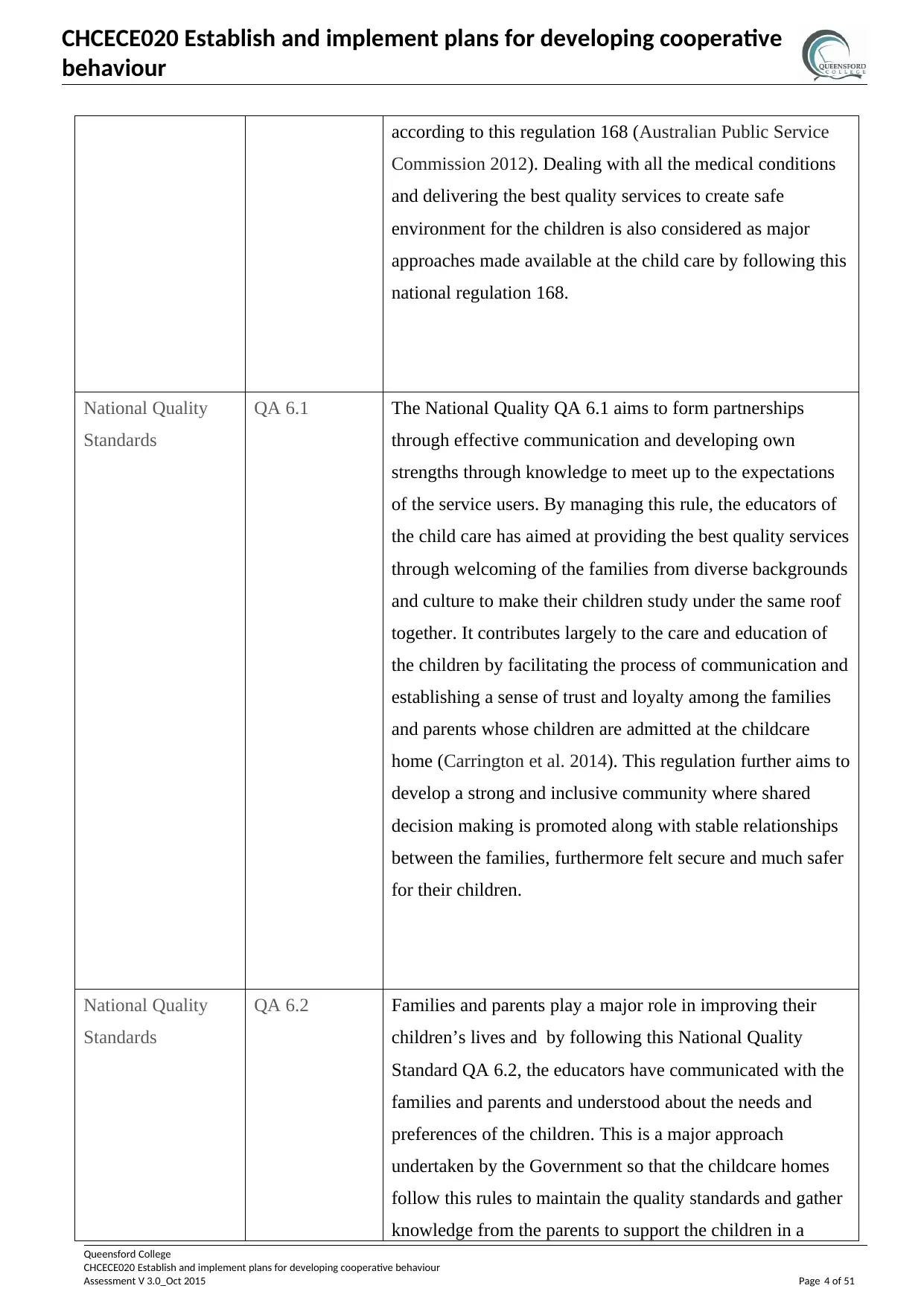
CHCECE020 Establish and implement plans for developing cooperative
behaviour
according to this regulation 168 (Australian Public Service
Commission 2012). Dealing with all the medical conditions
and delivering the best quality services to create safe
environment for the children is also considered as major
approaches made available at the child care by following this
national regulation 168.
National Quality
Standards
QA 6.1 The National Quality QA 6.1 aims to form partnerships
through effective communication and developing own
strengths through knowledge to meet up to the expectations
of the service users. By managing this rule, the educators of
the child care has aimed at providing the best quality services
through welcoming of the families from diverse backgrounds
and culture to make their children study under the same roof
together. It contributes largely to the care and education of
the children by facilitating the process of communication and
establishing a sense of trust and loyalty among the families
and parents whose children are admitted at the childcare
home (Carrington et al. 2014). This regulation further aims to
develop a strong and inclusive community where shared
decision making is promoted along with stable relationships
between the families, furthermore felt secure and much safer
for their children.
National Quality
Standards
QA 6.2 Families and parents play a major role in improving their
children’s lives and by following this National Quality
Standard QA 6.2, the educators have communicated with the
families and parents and understood about the needs and
preferences of the children. This is a major approach
undertaken by the Government so that the childcare homes
follow this rules to maintain the quality standards and gather
knowledge from the parents to support the children in a
Queensford College
CHCECE020 Establish and implement plans for developing cooperative behaviour
Assessment V 3.0_Oct 2015 Page 4 of 51
behaviour
according to this regulation 168 (Australian Public Service
Commission 2012). Dealing with all the medical conditions
and delivering the best quality services to create safe
environment for the children is also considered as major
approaches made available at the child care by following this
national regulation 168.
National Quality
Standards
QA 6.1 The National Quality QA 6.1 aims to form partnerships
through effective communication and developing own
strengths through knowledge to meet up to the expectations
of the service users. By managing this rule, the educators of
the child care has aimed at providing the best quality services
through welcoming of the families from diverse backgrounds
and culture to make their children study under the same roof
together. It contributes largely to the care and education of
the children by facilitating the process of communication and
establishing a sense of trust and loyalty among the families
and parents whose children are admitted at the childcare
home (Carrington et al. 2014). This regulation further aims to
develop a strong and inclusive community where shared
decision making is promoted along with stable relationships
between the families, furthermore felt secure and much safer
for their children.
National Quality
Standards
QA 6.2 Families and parents play a major role in improving their
children’s lives and by following this National Quality
Standard QA 6.2, the educators have communicated with the
families and parents and understood about the needs and
preferences of the children. This is a major approach
undertaken by the Government so that the childcare homes
follow this rules to maintain the quality standards and gather
knowledge from the parents to support the children in a
Queensford College
CHCECE020 Establish and implement plans for developing cooperative behaviour
Assessment V 3.0_Oct 2015 Page 4 of 51
Paraphrase This Document
Need a fresh take? Get an instant paraphrase of this document with our AI Paraphraser
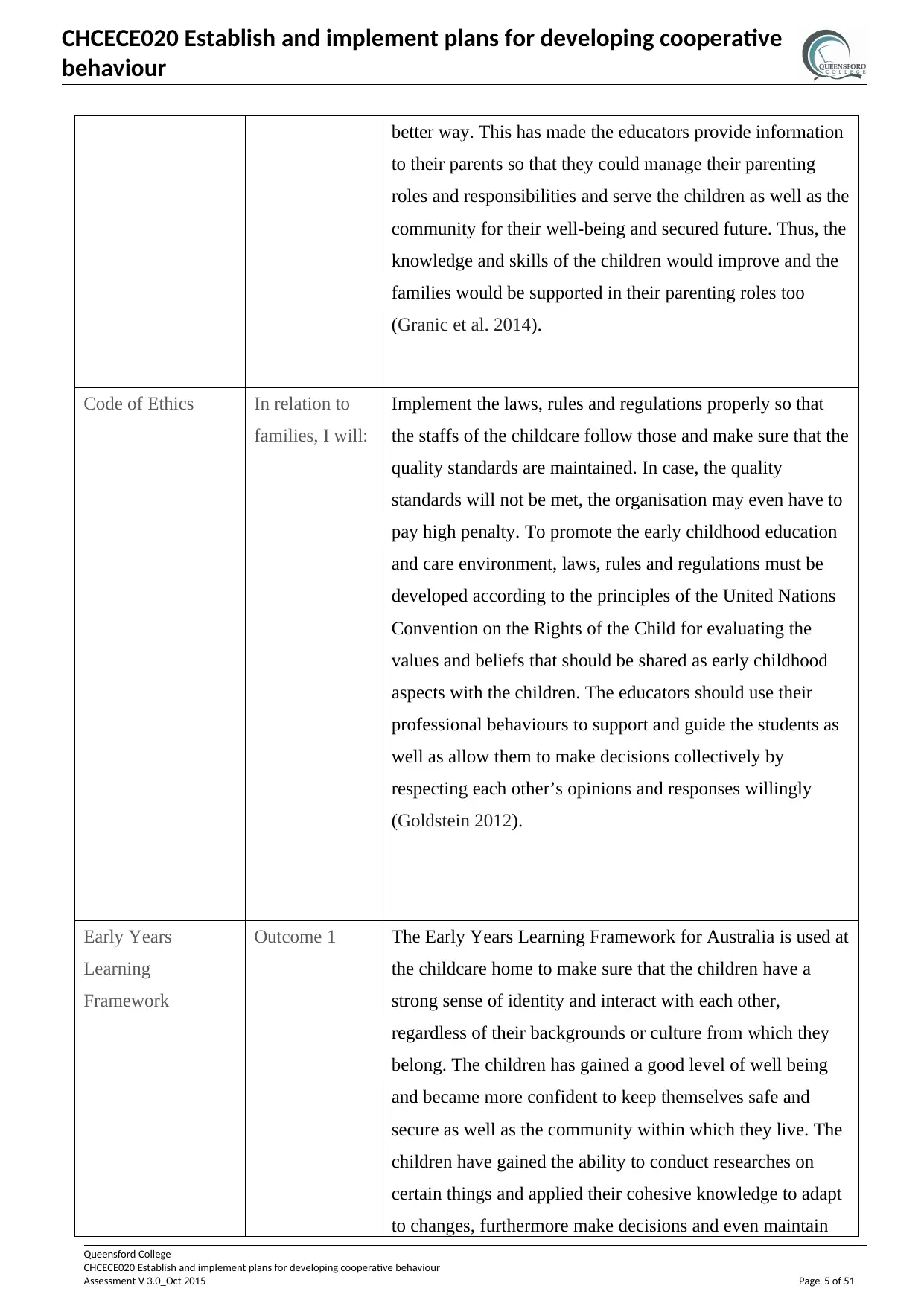
CHCECE020 Establish and implement plans for developing cooperative
behaviour
better way. This has made the educators provide information
to their parents so that they could manage their parenting
roles and responsibilities and serve the children as well as the
community for their well-being and secured future. Thus, the
knowledge and skills of the children would improve and the
families would be supported in their parenting roles too
(Granic et al. 2014).
Code of Ethics In relation to
families, I will:
Implement the laws, rules and regulations properly so that
the staffs of the childcare follow those and make sure that the
quality standards are maintained. In case, the quality
standards will not be met, the organisation may even have to
pay high penalty. To promote the early childhood education
and care environment, laws, rules and regulations must be
developed according to the principles of the United Nations
Convention on the Rights of the Child for evaluating the
values and beliefs that should be shared as early childhood
aspects with the children. The educators should use their
professional behaviours to support and guide the students as
well as allow them to make decisions collectively by
respecting each other’s opinions and responses willingly
(Goldstein 2012).
Early Years
Learning
Framework
Outcome 1 The Early Years Learning Framework for Australia is used at
the childcare home to make sure that the children have a
strong sense of identity and interact with each other,
regardless of their backgrounds or culture from which they
belong. The children has gained a good level of well being
and became more confident to keep themselves safe and
secure as well as the community within which they live. The
children have gained the ability to conduct researches on
certain things and applied their cohesive knowledge to adapt
to changes, furthermore make decisions and even maintain
Queensford College
CHCECE020 Establish and implement plans for developing cooperative behaviour
Assessment V 3.0_Oct 2015 Page 5 of 51
behaviour
better way. This has made the educators provide information
to their parents so that they could manage their parenting
roles and responsibilities and serve the children as well as the
community for their well-being and secured future. Thus, the
knowledge and skills of the children would improve and the
families would be supported in their parenting roles too
(Granic et al. 2014).
Code of Ethics In relation to
families, I will:
Implement the laws, rules and regulations properly so that
the staffs of the childcare follow those and make sure that the
quality standards are maintained. In case, the quality
standards will not be met, the organisation may even have to
pay high penalty. To promote the early childhood education
and care environment, laws, rules and regulations must be
developed according to the principles of the United Nations
Convention on the Rights of the Child for evaluating the
values and beliefs that should be shared as early childhood
aspects with the children. The educators should use their
professional behaviours to support and guide the students as
well as allow them to make decisions collectively by
respecting each other’s opinions and responses willingly
(Goldstein 2012).
Early Years
Learning
Framework
Outcome 1 The Early Years Learning Framework for Australia is used at
the childcare home to make sure that the children have a
strong sense of identity and interact with each other,
regardless of their backgrounds or culture from which they
belong. The children has gained a good level of well being
and became more confident to keep themselves safe and
secure as well as the community within which they live. The
children have gained the ability to conduct researches on
certain things and applied their cohesive knowledge to adapt
to changes, furthermore make decisions and even maintain
Queensford College
CHCECE020 Establish and implement plans for developing cooperative behaviour
Assessment V 3.0_Oct 2015 Page 5 of 51
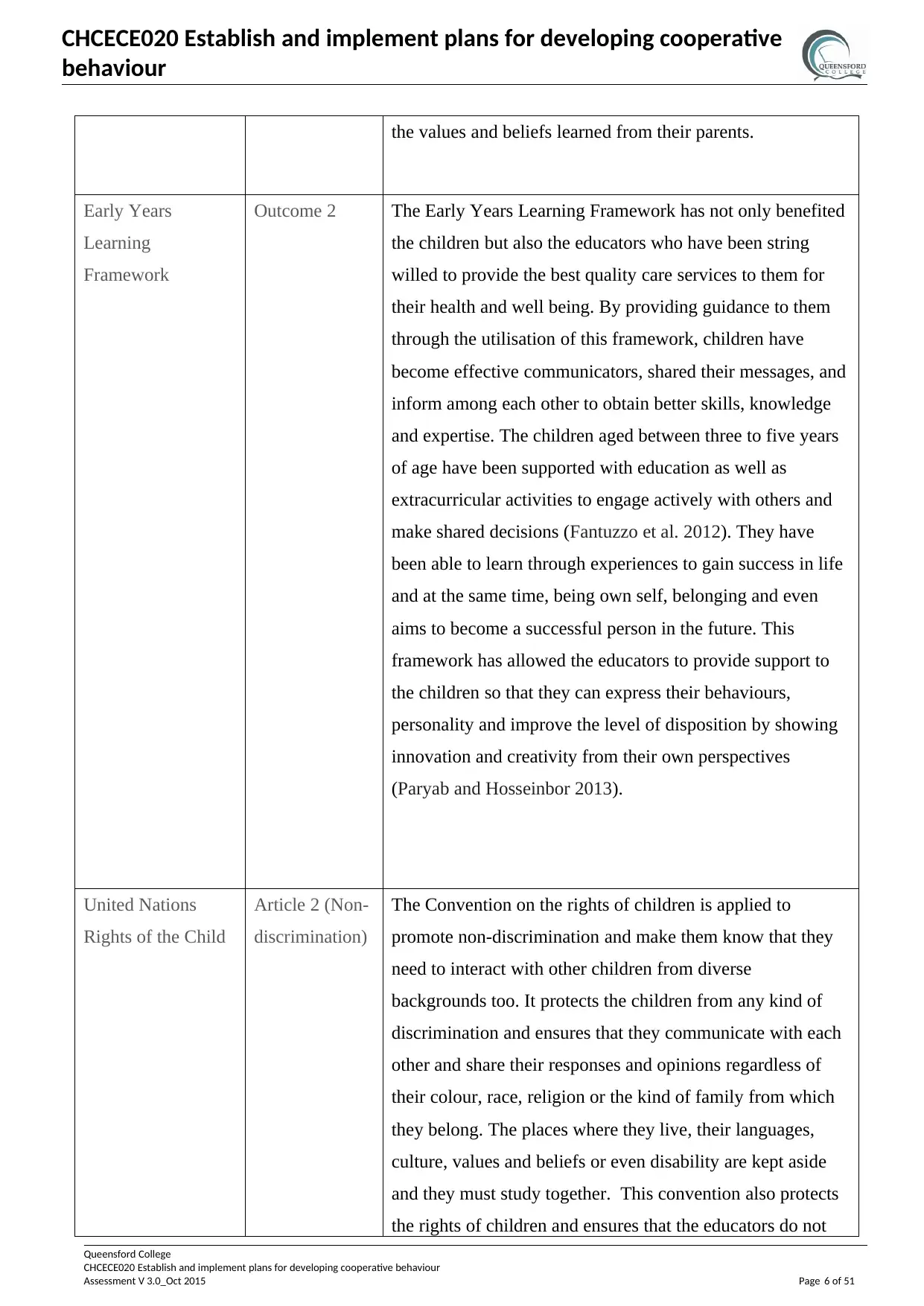
CHCECE020 Establish and implement plans for developing cooperative
behaviour
the values and beliefs learned from their parents.
Early Years
Learning
Framework
Outcome 2 The Early Years Learning Framework has not only benefited
the children but also the educators who have been string
willed to provide the best quality care services to them for
their health and well being. By providing guidance to them
through the utilisation of this framework, children have
become effective communicators, shared their messages, and
inform among each other to obtain better skills, knowledge
and expertise. The children aged between three to five years
of age have been supported with education as well as
extracurricular activities to engage actively with others and
make shared decisions (Fantuzzo et al. 2012). They have
been able to learn through experiences to gain success in life
and at the same time, being own self, belonging and even
aims to become a successful person in the future. This
framework has allowed the educators to provide support to
the children so that they can express their behaviours,
personality and improve the level of disposition by showing
innovation and creativity from their own perspectives
(Paryab and Hosseinbor 2013).
United Nations
Rights of the Child
Article 2 (Non-
discrimination)
The Convention on the rights of children is applied to
promote non-discrimination and make them know that they
need to interact with other children from diverse
backgrounds too. It protects the children from any kind of
discrimination and ensures that they communicate with each
other and share their responses and opinions regardless of
their colour, race, religion or the kind of family from which
they belong. The places where they live, their languages,
culture, values and beliefs or even disability are kept aside
and they must study together. This convention also protects
the rights of children and ensures that the educators do not
Queensford College
CHCECE020 Establish and implement plans for developing cooperative behaviour
Assessment V 3.0_Oct 2015 Page 6 of 51
behaviour
the values and beliefs learned from their parents.
Early Years
Learning
Framework
Outcome 2 The Early Years Learning Framework has not only benefited
the children but also the educators who have been string
willed to provide the best quality care services to them for
their health and well being. By providing guidance to them
through the utilisation of this framework, children have
become effective communicators, shared their messages, and
inform among each other to obtain better skills, knowledge
and expertise. The children aged between three to five years
of age have been supported with education as well as
extracurricular activities to engage actively with others and
make shared decisions (Fantuzzo et al. 2012). They have
been able to learn through experiences to gain success in life
and at the same time, being own self, belonging and even
aims to become a successful person in the future. This
framework has allowed the educators to provide support to
the children so that they can express their behaviours,
personality and improve the level of disposition by showing
innovation and creativity from their own perspectives
(Paryab and Hosseinbor 2013).
United Nations
Rights of the Child
Article 2 (Non-
discrimination)
The Convention on the rights of children is applied to
promote non-discrimination and make them know that they
need to interact with other children from diverse
backgrounds too. It protects the children from any kind of
discrimination and ensures that they communicate with each
other and share their responses and opinions regardless of
their colour, race, religion or the kind of family from which
they belong. The places where they live, their languages,
culture, values and beliefs or even disability are kept aside
and they must study together. This convention also protects
the rights of children and ensures that the educators do not
Queensford College
CHCECE020 Establish and implement plans for developing cooperative behaviour
Assessment V 3.0_Oct 2015 Page 6 of 51
⊘ This is a preview!⊘
Do you want full access?
Subscribe today to unlock all pages.

Trusted by 1+ million students worldwide
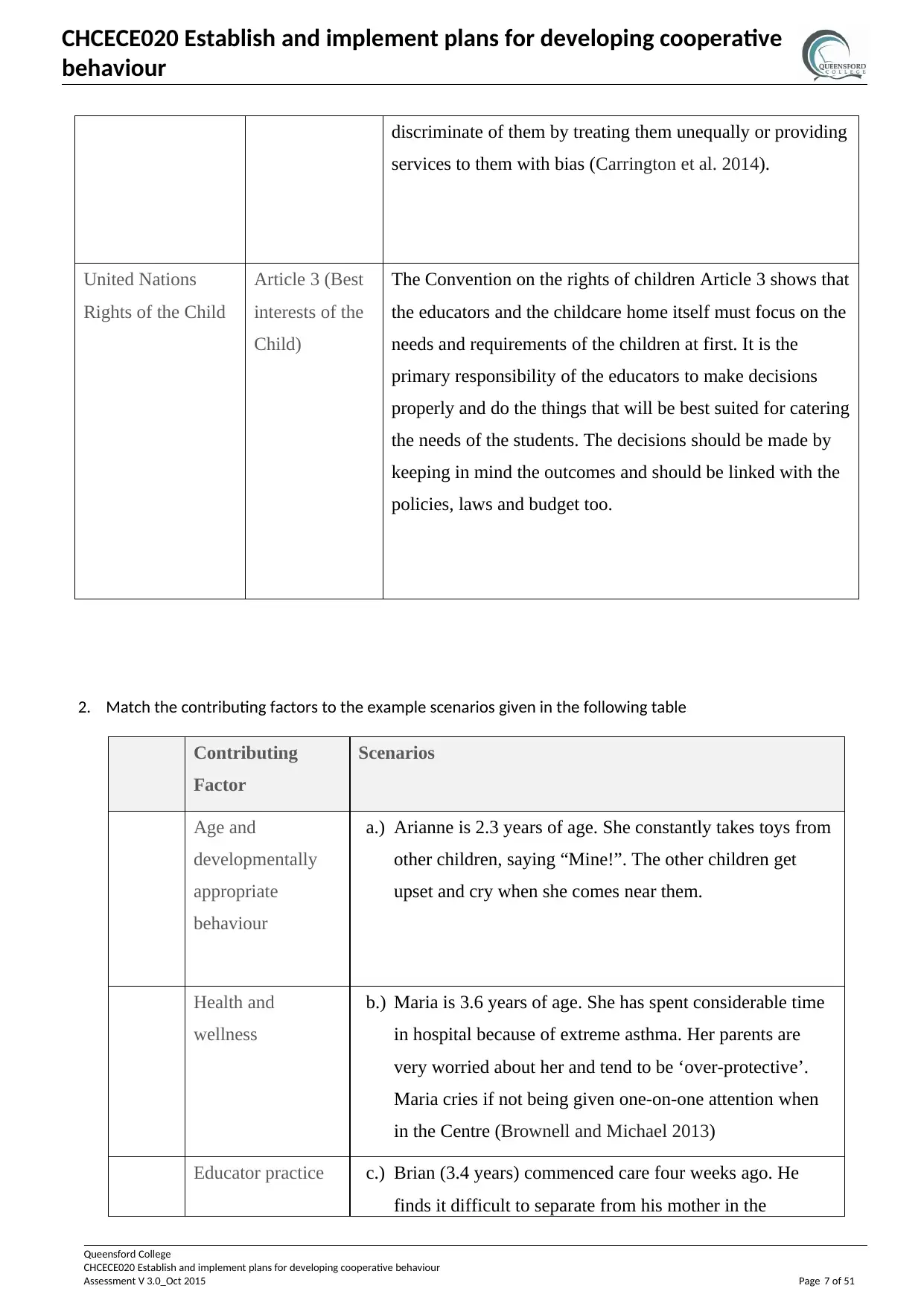
CHCECE020 Establish and implement plans for developing cooperative
behaviour
discriminate of them by treating them unequally or providing
services to them with bias (Carrington et al. 2014).
United Nations
Rights of the Child
Article 3 (Best
interests of the
Child)
The Convention on the rights of children Article 3 shows that
the educators and the childcare home itself must focus on the
needs and requirements of the children at first. It is the
primary responsibility of the educators to make decisions
properly and do the things that will be best suited for catering
the needs of the students. The decisions should be made by
keeping in mind the outcomes and should be linked with the
policies, laws and budget too.
2. Match the contributing factors to the example scenarios given in the following table
Contributing
Factor
Scenarios
Age and
developmentally
appropriate
behaviour
a.) Arianne is 2.3 years of age. She constantly takes toys from
other children, saying “Mine!”. The other children get
upset and cry when she comes near them.
Health and
wellness
b.) Maria is 3.6 years of age. She has spent considerable time
in hospital because of extreme asthma. Her parents are
very worried about her and tend to be ‘over-protective’.
Maria cries if not being given one-on-one attention when
in the Centre (Brownell and Michael 2013)
Educator practice c.) Brian (3.4 years) commenced care four weeks ago. He
finds it difficult to separate from his mother in the
Queensford College
CHCECE020 Establish and implement plans for developing cooperative behaviour
Assessment V 3.0_Oct 2015 Page 7 of 51
behaviour
discriminate of them by treating them unequally or providing
services to them with bias (Carrington et al. 2014).
United Nations
Rights of the Child
Article 3 (Best
interests of the
Child)
The Convention on the rights of children Article 3 shows that
the educators and the childcare home itself must focus on the
needs and requirements of the children at first. It is the
primary responsibility of the educators to make decisions
properly and do the things that will be best suited for catering
the needs of the students. The decisions should be made by
keeping in mind the outcomes and should be linked with the
policies, laws and budget too.
2. Match the contributing factors to the example scenarios given in the following table
Contributing
Factor
Scenarios
Age and
developmentally
appropriate
behaviour
a.) Arianne is 2.3 years of age. She constantly takes toys from
other children, saying “Mine!”. The other children get
upset and cry when she comes near them.
Health and
wellness
b.) Maria is 3.6 years of age. She has spent considerable time
in hospital because of extreme asthma. Her parents are
very worried about her and tend to be ‘over-protective’.
Maria cries if not being given one-on-one attention when
in the Centre (Brownell and Michael 2013)
Educator practice c.) Brian (3.4 years) commenced care four weeks ago. He
finds it difficult to separate from his mother in the
Queensford College
CHCECE020 Establish and implement plans for developing cooperative behaviour
Assessment V 3.0_Oct 2015 Page 7 of 51
Paraphrase This Document
Need a fresh take? Get an instant paraphrase of this document with our AI Paraphraser
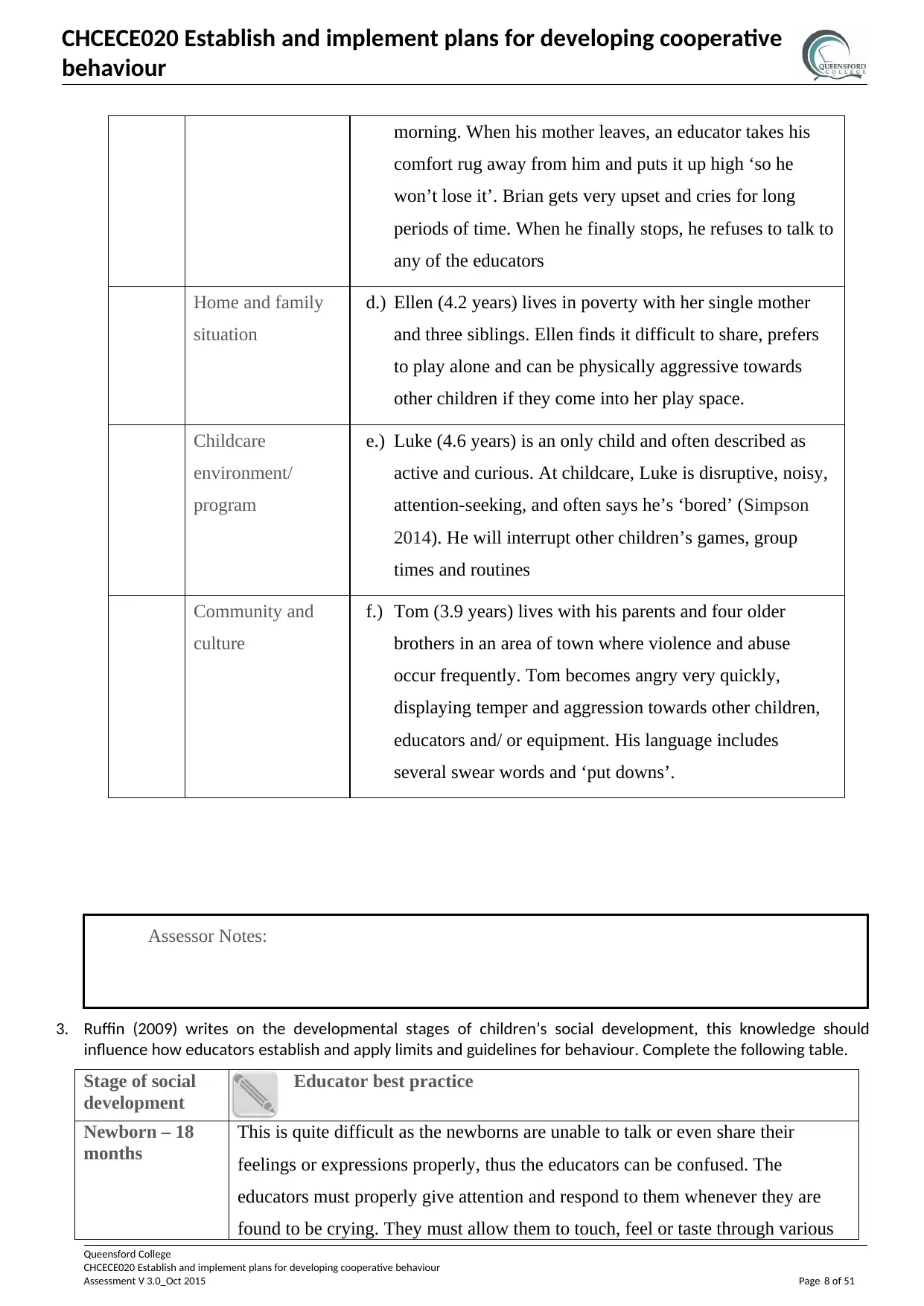
CHCECE020 Establish and implement plans for developing cooperative
behaviour
morning. When his mother leaves, an educator takes his
comfort rug away from him and puts it up high ‘so he
won’t lose it’. Brian gets very upset and cries for long
periods of time. When he finally stops, he refuses to talk to
any of the educators
Home and family
situation
d.) Ellen (4.2 years) lives in poverty with her single mother
and three siblings. Ellen finds it difficult to share, prefers
to play alone and can be physically aggressive towards
other children if they come into her play space.
Childcare
environment/
program
e.) Luke (4.6 years) is an only child and often described as
active and curious. At childcare, Luke is disruptive, noisy,
attention-seeking, and often says he’s ‘bored’ (Simpson
2014). He will interrupt other children’s games, group
times and routines
Community and
culture
f.) Tom (3.9 years) lives with his parents and four older
brothers in an area of town where violence and abuse
occur frequently. Tom becomes angry very quickly,
displaying temper and aggression towards other children,
educators and/ or equipment. His language includes
several swear words and ‘put downs’.
Assessor Notes:
3. Ruffin (2009) writes on the developmental stages of children’s social development, this knowledge should
influence how educators establish and apply limits and guidelines for behaviour. Complete the following table.
Stage of social
development
Educator best practice
Newborn – 18
months
This is quite difficult as the newborns are unable to talk or even share their
feelings or expressions properly, thus the educators can be confused. The
educators must properly give attention and respond to them whenever they are
found to be crying. They must allow them to touch, feel or taste through various
Queensford College
CHCECE020 Establish and implement plans for developing cooperative behaviour
Assessment V 3.0_Oct 2015 Page 8 of 51
behaviour
morning. When his mother leaves, an educator takes his
comfort rug away from him and puts it up high ‘so he
won’t lose it’. Brian gets very upset and cries for long
periods of time. When he finally stops, he refuses to talk to
any of the educators
Home and family
situation
d.) Ellen (4.2 years) lives in poverty with her single mother
and three siblings. Ellen finds it difficult to share, prefers
to play alone and can be physically aggressive towards
other children if they come into her play space.
Childcare
environment/
program
e.) Luke (4.6 years) is an only child and often described as
active and curious. At childcare, Luke is disruptive, noisy,
attention-seeking, and often says he’s ‘bored’ (Simpson
2014). He will interrupt other children’s games, group
times and routines
Community and
culture
f.) Tom (3.9 years) lives with his parents and four older
brothers in an area of town where violence and abuse
occur frequently. Tom becomes angry very quickly,
displaying temper and aggression towards other children,
educators and/ or equipment. His language includes
several swear words and ‘put downs’.
Assessor Notes:
3. Ruffin (2009) writes on the developmental stages of children’s social development, this knowledge should
influence how educators establish and apply limits and guidelines for behaviour. Complete the following table.
Stage of social
development
Educator best practice
Newborn – 18
months
This is quite difficult as the newborns are unable to talk or even share their
feelings or expressions properly, thus the educators can be confused. The
educators must properly give attention and respond to them whenever they are
found to be crying. They must allow them to touch, feel or taste through various
Queensford College
CHCECE020 Establish and implement plans for developing cooperative behaviour
Assessment V 3.0_Oct 2015 Page 8 of 51
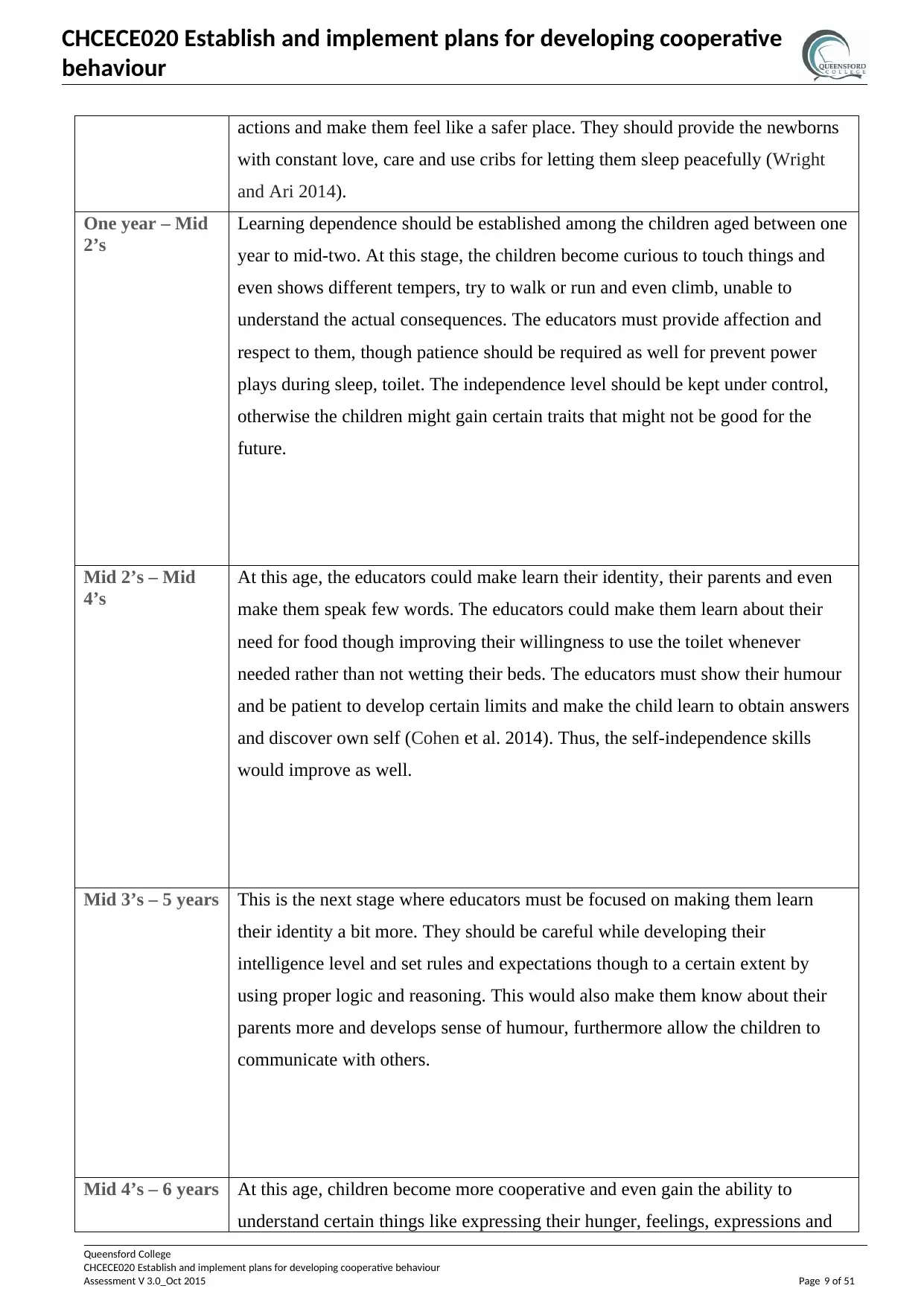
CHCECE020 Establish and implement plans for developing cooperative
behaviour
actions and make them feel like a safer place. They should provide the newborns
with constant love, care and use cribs for letting them sleep peacefully (Wright
and Ari 2014).
One year – Mid
2’s
Learning dependence should be established among the children aged between one
year to mid-two. At this stage, the children become curious to touch things and
even shows different tempers, try to walk or run and even climb, unable to
understand the actual consequences. The educators must provide affection and
respect to them, though patience should be required as well for prevent power
plays during sleep, toilet. The independence level should be kept under control,
otherwise the children might gain certain traits that might not be good for the
future.
Mid 2’s – Mid
4’s
At this age, the educators could make learn their identity, their parents and even
make them speak few words. The educators could make them learn about their
need for food though improving their willingness to use the toilet whenever
needed rather than not wetting their beds. The educators must show their humour
and be patient to develop certain limits and make the child learn to obtain answers
and discover own self (Cohen et al. 2014). Thus, the self-independence skills
would improve as well.
Mid 3’s – 5 years This is the next stage where educators must be focused on making them learn
their identity a bit more. They should be careful while developing their
intelligence level and set rules and expectations though to a certain extent by
using proper logic and reasoning. This would also make them know about their
parents more and develops sense of humour, furthermore allow the children to
communicate with others.
Mid 4’s – 6 years At this age, children become more cooperative and even gain the ability to
understand certain things like expressing their hunger, feelings, expressions and
Queensford College
CHCECE020 Establish and implement plans for developing cooperative behaviour
Assessment V 3.0_Oct 2015 Page 9 of 51
behaviour
actions and make them feel like a safer place. They should provide the newborns
with constant love, care and use cribs for letting them sleep peacefully (Wright
and Ari 2014).
One year – Mid
2’s
Learning dependence should be established among the children aged between one
year to mid-two. At this stage, the children become curious to touch things and
even shows different tempers, try to walk or run and even climb, unable to
understand the actual consequences. The educators must provide affection and
respect to them, though patience should be required as well for prevent power
plays during sleep, toilet. The independence level should be kept under control,
otherwise the children might gain certain traits that might not be good for the
future.
Mid 2’s – Mid
4’s
At this age, the educators could make learn their identity, their parents and even
make them speak few words. The educators could make them learn about their
need for food though improving their willingness to use the toilet whenever
needed rather than not wetting their beds. The educators must show their humour
and be patient to develop certain limits and make the child learn to obtain answers
and discover own self (Cohen et al. 2014). Thus, the self-independence skills
would improve as well.
Mid 3’s – 5 years This is the next stage where educators must be focused on making them learn
their identity a bit more. They should be careful while developing their
intelligence level and set rules and expectations though to a certain extent by
using proper logic and reasoning. This would also make them know about their
parents more and develops sense of humour, furthermore allow the children to
communicate with others.
Mid 4’s – 6 years At this age, children become more cooperative and even gain the ability to
understand certain things like expressing their hunger, feelings, expressions and
Queensford College
CHCECE020 Establish and implement plans for developing cooperative behaviour
Assessment V 3.0_Oct 2015 Page 9 of 51
⊘ This is a preview!⊘
Do you want full access?
Subscribe today to unlock all pages.

Trusted by 1+ million students worldwide
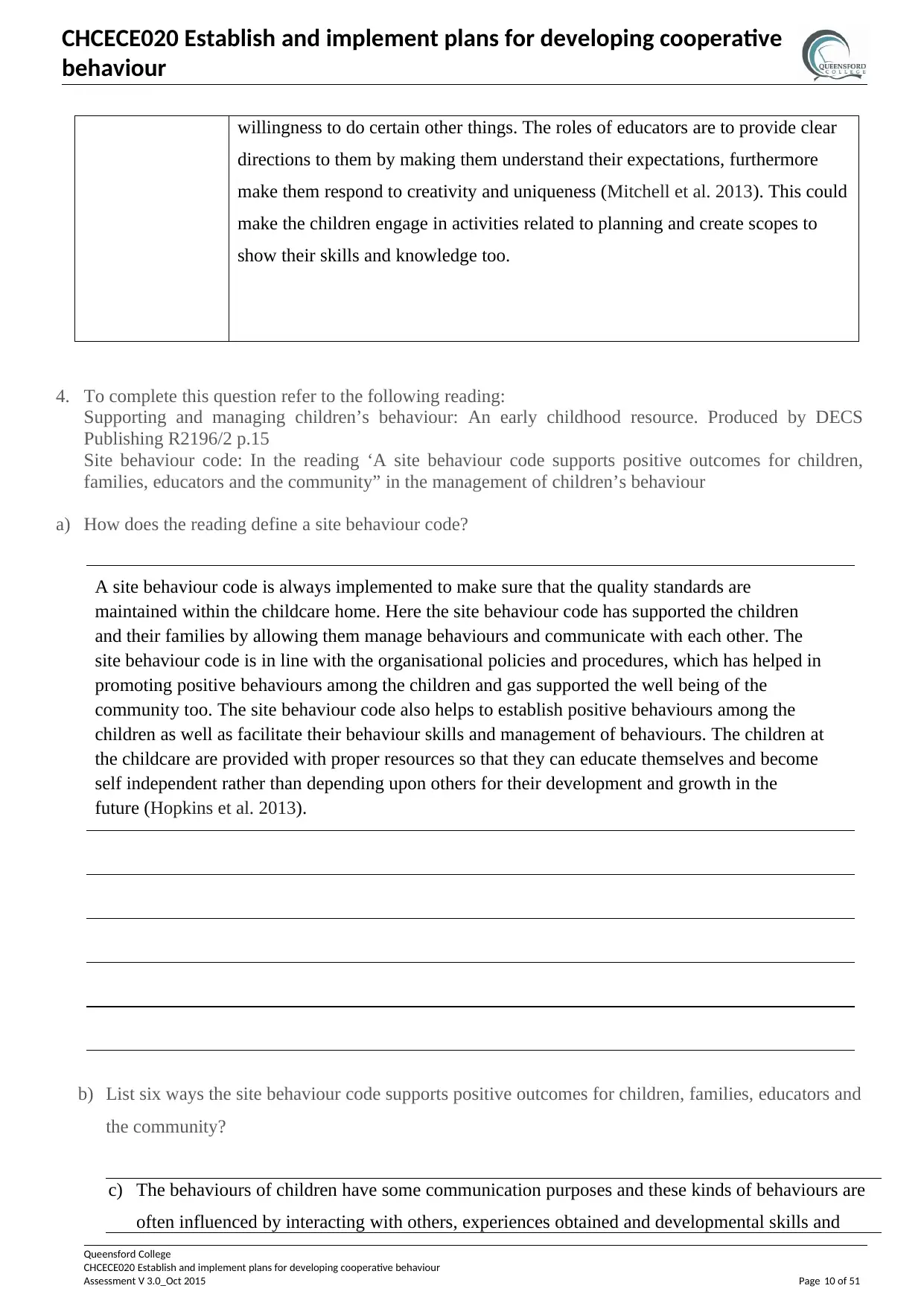
CHCECE020 Establish and implement plans for developing cooperative
behaviour
willingness to do certain other things. The roles of educators are to provide clear
directions to them by making them understand their expectations, furthermore
make them respond to creativity and uniqueness (Mitchell et al. 2013). This could
make the children engage in activities related to planning and create scopes to
show their skills and knowledge too.
4. To complete this question refer to the following reading:
Supporting and managing children’s behaviour: An early childhood resource. Produced by DECS
Publishing R2196/2 p.15
Site behaviour code: In the reading ‘A site behaviour code supports positive outcomes for children,
families, educators and the community” in the management of children’s behaviour
a) How does the reading define a site behaviour code?
A site behaviour code is always implemented to make sure that the quality standards are
maintained within the childcare home. Here the site behaviour code has supported the children
and their families by allowing them manage behaviours and communicate with each other. The
site behaviour code is in line with the organisational policies and procedures, which has helped in
promoting positive behaviours among the children and gas supported the well being of the
community too. The site behaviour code also helps to establish positive behaviours among the
children as well as facilitate their behaviour skills and management of behaviours. The children at
the childcare are provided with proper resources so that they can educate themselves and become
self independent rather than depending upon others for their development and growth in the
future (Hopkins et al. 2013).
b) List six ways the site behaviour code supports positive outcomes for children, families, educators and
the community?
c) The behaviours of children have some communication purposes and these kinds of behaviours are
often influenced by interacting with others, experiences obtained and developmental skills and
Queensford College
CHCECE020 Establish and implement plans for developing cooperative behaviour
Assessment V 3.0_Oct 2015 Page 10 of 51
behaviour
willingness to do certain other things. The roles of educators are to provide clear
directions to them by making them understand their expectations, furthermore
make them respond to creativity and uniqueness (Mitchell et al. 2013). This could
make the children engage in activities related to planning and create scopes to
show their skills and knowledge too.
4. To complete this question refer to the following reading:
Supporting and managing children’s behaviour: An early childhood resource. Produced by DECS
Publishing R2196/2 p.15
Site behaviour code: In the reading ‘A site behaviour code supports positive outcomes for children,
families, educators and the community” in the management of children’s behaviour
a) How does the reading define a site behaviour code?
A site behaviour code is always implemented to make sure that the quality standards are
maintained within the childcare home. Here the site behaviour code has supported the children
and their families by allowing them manage behaviours and communicate with each other. The
site behaviour code is in line with the organisational policies and procedures, which has helped in
promoting positive behaviours among the children and gas supported the well being of the
community too. The site behaviour code also helps to establish positive behaviours among the
children as well as facilitate their behaviour skills and management of behaviours. The children at
the childcare are provided with proper resources so that they can educate themselves and become
self independent rather than depending upon others for their development and growth in the
future (Hopkins et al. 2013).
b) List six ways the site behaviour code supports positive outcomes for children, families, educators and
the community?
c) The behaviours of children have some communication purposes and these kinds of behaviours are
often influenced by interacting with others, experiences obtained and developmental skills and
Queensford College
CHCECE020 Establish and implement plans for developing cooperative behaviour
Assessment V 3.0_Oct 2015 Page 10 of 51
Paraphrase This Document
Need a fresh take? Get an instant paraphrase of this document with our AI Paraphraser
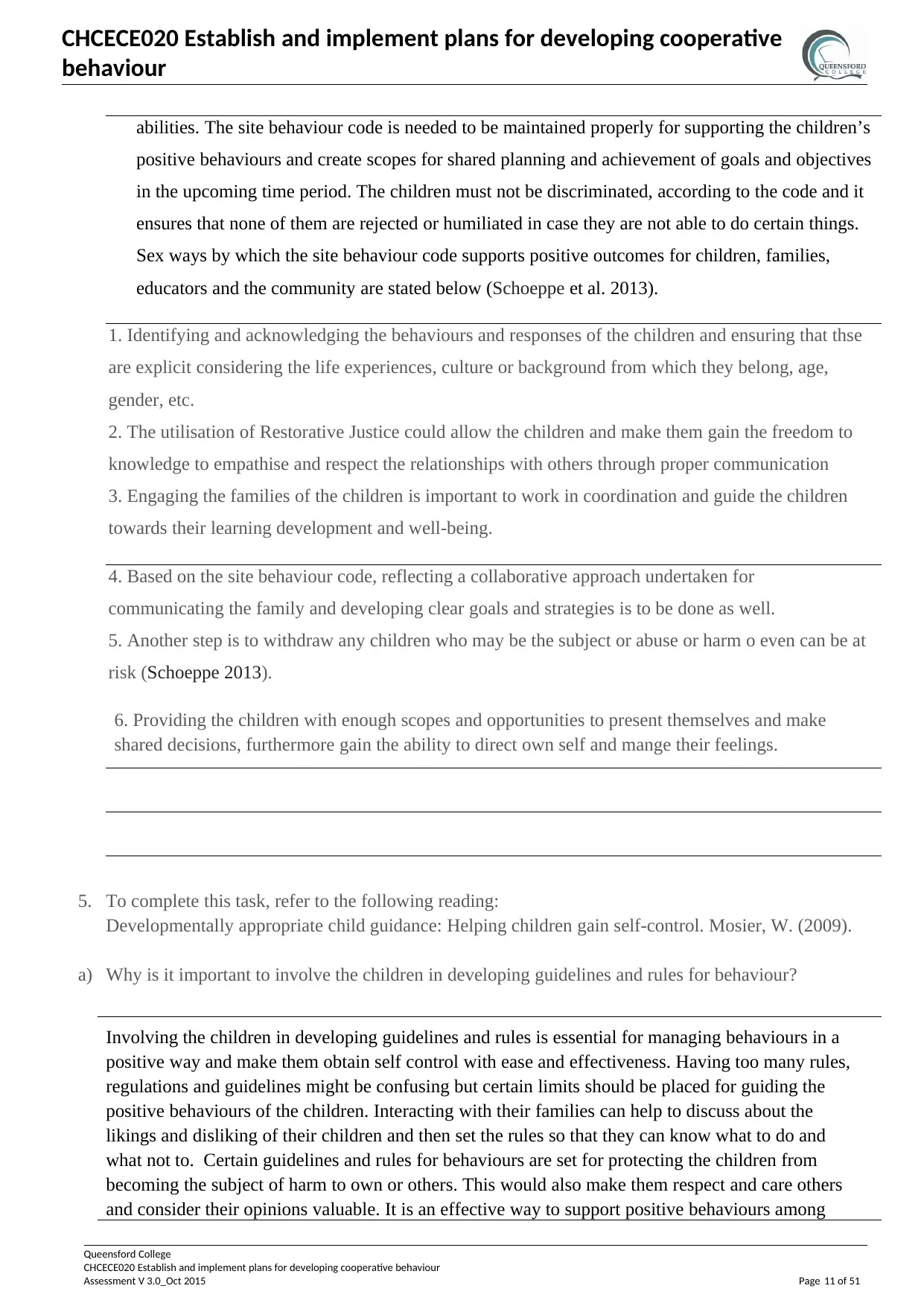
CHCECE020 Establish and implement plans for developing cooperative
behaviour
abilities. The site behaviour code is needed to be maintained properly for supporting the children’s
positive behaviours and create scopes for shared planning and achievement of goals and objectives
in the upcoming time period. The children must not be discriminated, according to the code and it
ensures that none of them are rejected or humiliated in case they are not able to do certain things.
Sex ways by which the site behaviour code supports positive outcomes for children, families,
educators and the community are stated below (Schoeppe et al. 2013).
1. Identifying and acknowledging the behaviours and responses of the children and ensuring that thse
are explicit considering the life experiences, culture or background from which they belong, age,
gender, etc.
2. The utilisation of Restorative Justice could allow the children and make them gain the freedom to
knowledge to empathise and respect the relationships with others through proper communication
3. Engaging the families of the children is important to work in coordination and guide the children
towards their learning development and well-being.
4. Based on the site behaviour code, reflecting a collaborative approach undertaken for
communicating the family and developing clear goals and strategies is to be done as well.
5. Another step is to withdraw any children who may be the subject or abuse or harm o even can be at
risk (Schoeppe 2013).
6. Providing the children with enough scopes and opportunities to present themselves and make
shared decisions, furthermore gain the ability to direct own self and mange their feelings.
5. To complete this task, refer to the following reading:
Developmentally appropriate child guidance: Helping children gain self-control. Mosier, W. (2009).
a) Why is it important to involve the children in developing guidelines and rules for behaviour?
Involving the children in developing guidelines and rules is essential for managing behaviours in a
positive way and make them obtain self control with ease and effectiveness. Having too many rules,
regulations and guidelines might be confusing but certain limits should be placed for guiding the
positive behaviours of the children. Interacting with their families can help to discuss about the
likings and disliking of their children and then set the rules so that they can know what to do and
what not to. Certain guidelines and rules for behaviours are set for protecting the children from
becoming the subject of harm to own or others. This would also make them respect and care others
and consider their opinions valuable. It is an effective way to support positive behaviours among
Queensford College
CHCECE020 Establish and implement plans for developing cooperative behaviour
Assessment V 3.0_Oct 2015 Page 11 of 51
behaviour
abilities. The site behaviour code is needed to be maintained properly for supporting the children’s
positive behaviours and create scopes for shared planning and achievement of goals and objectives
in the upcoming time period. The children must not be discriminated, according to the code and it
ensures that none of them are rejected or humiliated in case they are not able to do certain things.
Sex ways by which the site behaviour code supports positive outcomes for children, families,
educators and the community are stated below (Schoeppe et al. 2013).
1. Identifying and acknowledging the behaviours and responses of the children and ensuring that thse
are explicit considering the life experiences, culture or background from which they belong, age,
gender, etc.
2. The utilisation of Restorative Justice could allow the children and make them gain the freedom to
knowledge to empathise and respect the relationships with others through proper communication
3. Engaging the families of the children is important to work in coordination and guide the children
towards their learning development and well-being.
4. Based on the site behaviour code, reflecting a collaborative approach undertaken for
communicating the family and developing clear goals and strategies is to be done as well.
5. Another step is to withdraw any children who may be the subject or abuse or harm o even can be at
risk (Schoeppe 2013).
6. Providing the children with enough scopes and opportunities to present themselves and make
shared decisions, furthermore gain the ability to direct own self and mange their feelings.
5. To complete this task, refer to the following reading:
Developmentally appropriate child guidance: Helping children gain self-control. Mosier, W. (2009).
a) Why is it important to involve the children in developing guidelines and rules for behaviour?
Involving the children in developing guidelines and rules is essential for managing behaviours in a
positive way and make them obtain self control with ease and effectiveness. Having too many rules,
regulations and guidelines might be confusing but certain limits should be placed for guiding the
positive behaviours of the children. Interacting with their families can help to discuss about the
likings and disliking of their children and then set the rules so that they can know what to do and
what not to. Certain guidelines and rules for behaviours are set for protecting the children from
becoming the subject of harm to own or others. This would also make them respect and care others
and consider their opinions valuable. It is an effective way to support positive behaviours among
Queensford College
CHCECE020 Establish and implement plans for developing cooperative behaviour
Assessment V 3.0_Oct 2015 Page 11 of 51
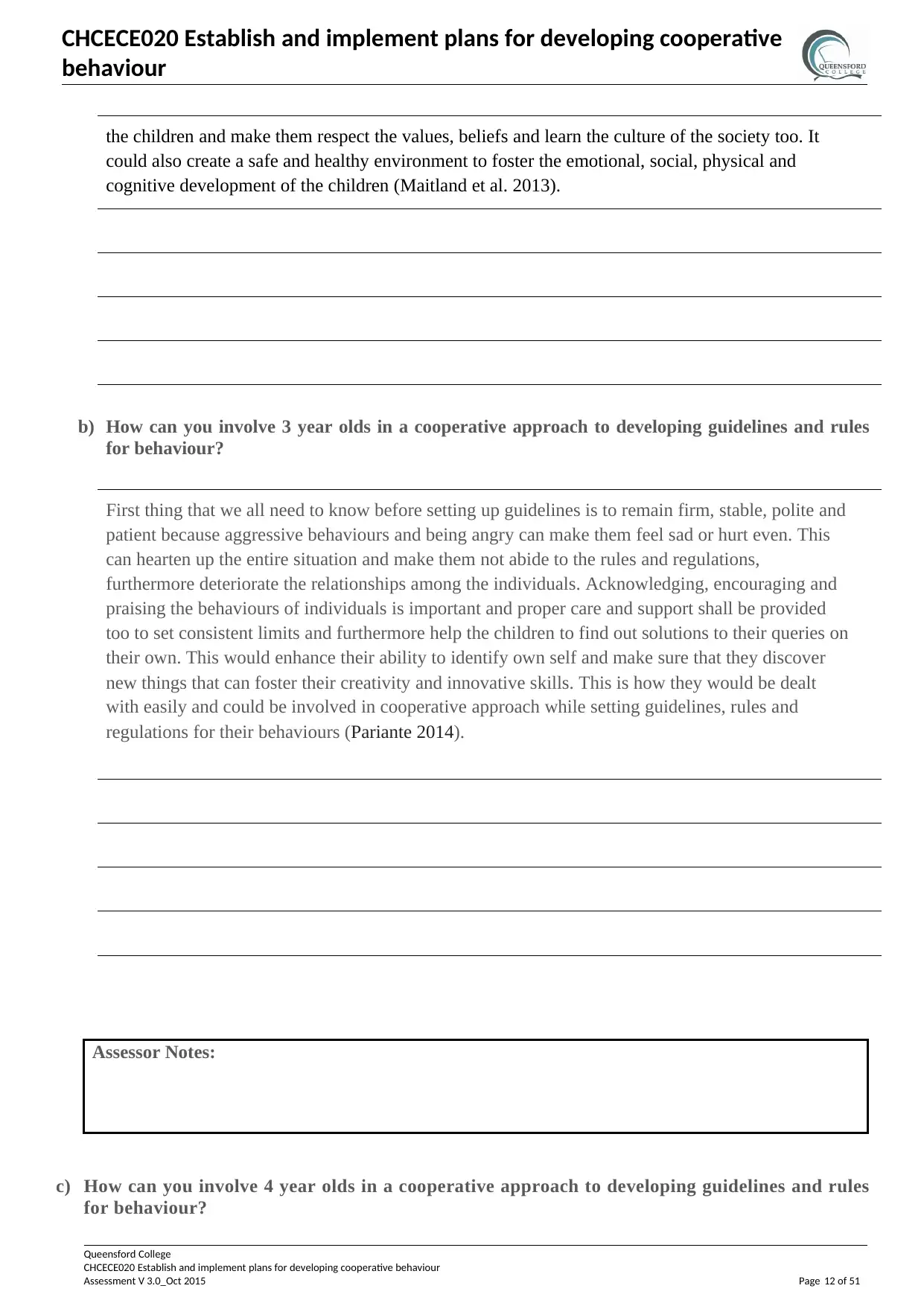
CHCECE020 Establish and implement plans for developing cooperative
behaviour
the children and make them respect the values, beliefs and learn the culture of the society too. It
could also create a safe and healthy environment to foster the emotional, social, physical and
cognitive development of the children (Maitland et al. 2013).
b) How can you involve 3 year olds in a cooperative approach to developing guidelines and rules
for behaviour?
First thing that we all need to know before setting up guidelines is to remain firm, stable, polite and
patient because aggressive behaviours and being angry can make them feel sad or hurt even. This
can hearten up the entire situation and make them not abide to the rules and regulations,
furthermore deteriorate the relationships among the individuals. Acknowledging, encouraging and
praising the behaviours of individuals is important and proper care and support shall be provided
too to set consistent limits and furthermore help the children to find out solutions to their queries on
their own. This would enhance their ability to identify own self and make sure that they discover
new things that can foster their creativity and innovative skills. This is how they would be dealt
with easily and could be involved in cooperative approach while setting guidelines, rules and
regulations for their behaviours (Pariante 2014).
Assessor Notes:
c) How can you involve 4 year olds in a cooperative approach to developing guidelines and rules
for behaviour?
Queensford College
CHCECE020 Establish and implement plans for developing cooperative behaviour
Assessment V 3.0_Oct 2015 Page 12 of 51
behaviour
the children and make them respect the values, beliefs and learn the culture of the society too. It
could also create a safe and healthy environment to foster the emotional, social, physical and
cognitive development of the children (Maitland et al. 2013).
b) How can you involve 3 year olds in a cooperative approach to developing guidelines and rules
for behaviour?
First thing that we all need to know before setting up guidelines is to remain firm, stable, polite and
patient because aggressive behaviours and being angry can make them feel sad or hurt even. This
can hearten up the entire situation and make them not abide to the rules and regulations,
furthermore deteriorate the relationships among the individuals. Acknowledging, encouraging and
praising the behaviours of individuals is important and proper care and support shall be provided
too to set consistent limits and furthermore help the children to find out solutions to their queries on
their own. This would enhance their ability to identify own self and make sure that they discover
new things that can foster their creativity and innovative skills. This is how they would be dealt
with easily and could be involved in cooperative approach while setting guidelines, rules and
regulations for their behaviours (Pariante 2014).
Assessor Notes:
c) How can you involve 4 year olds in a cooperative approach to developing guidelines and rules
for behaviour?
Queensford College
CHCECE020 Establish and implement plans for developing cooperative behaviour
Assessment V 3.0_Oct 2015 Page 12 of 51
⊘ This is a preview!⊘
Do you want full access?
Subscribe today to unlock all pages.

Trusted by 1+ million students worldwide
1 out of 51
Related Documents
Your All-in-One AI-Powered Toolkit for Academic Success.
+13062052269
info@desklib.com
Available 24*7 on WhatsApp / Email
![[object Object]](/_next/static/media/star-bottom.7253800d.svg)
Unlock your academic potential
Copyright © 2020–2026 A2Z Services. All Rights Reserved. Developed and managed by ZUCOL.





